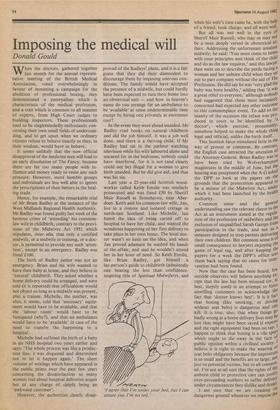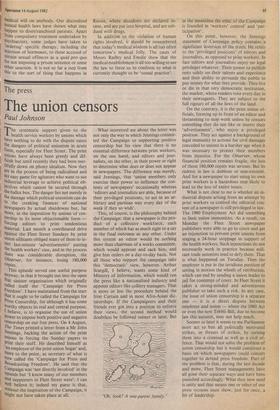Imposing the medical will
Donald Gould
It seems unlikely that the now official disapproval of the medicine men will lead to an early dissolution of The Fancy, because there are far too many people with in- fluence and money ready to resist any such pressure. However, more humble groups and individuals are less well able to ignore the prescriptions of their betters in the heal- ing trade.
Hence, for example, the remarkable trial of Mr Brian Radley at the instance of the West Midlands Regional Health Authority. Mr Radley was found guilty last week of the heinous crime of 'attending' his common- law wife in childbirth, contrary to the provi- sions of the Midwives • Act 1951 which stipulates, inter alia, that only a certified midwife, or a midwife in training, or a doc- tor, is permitted to provide any such 'atten- tion', except in an emergency. Radley was fined £100.
The birth of Radley junior was not an emergency. Brian and his wife wanted to have their baby at home, and they believe in 'natural' childbirth. They asked whether a home delivery could be arranged, and were told (it is reported) that officialdom would not object so long as a midwife was present, plus a trainee. Michelle, the mother, was also, it seems, told that 'necessary' equip- ment would have to be available, and that the 'labour room' would have to be fumigated (why?), and that an ambulance would have to be 'available' in case of the need to transfer the happening to a hospital.
Michelle had suffered the birth of a baby in an NHS hospital two years earlier and says: 'The whole process was like a produc- tion line. I was disgusted and determined not to let it happen again.' The sheer volume of writings which have appeared in the public prints over the past few years concerning the dissatisfaction so many women feel about hospital deliveries acquit her of any charge of simply being an 'awkward customer'.
However, the authorities clearly disap-
proved of the Radleys' plans, and it is a fair guess that they did their damnedest to discourage them by imposing onerous con- ditions. The family would have accepted the presence of a midwife, but could hardly have been expected to turn their home into an obstetrical unit — and how in heaven's name do you arrange for an ambulance to be 'available' at some undeterminable time except by hiring one privately at enormous cost?
In the event they went ahead unaided. Mr Radley read books on natural childbirth and did the job himself. It was a job well done, and there is a thriving child. If Mr Radley had sat in the parlour watching television while his wife laboured alone and uncared for in the bedroom, nobody could have interfered, for it is not (and clearly could not be) illegal for a woman to give birth unaided. But he did give aid, and that was his sin.
Last year a 25-year-old Scottish wood- worker called Keith Emslie was similarly prosecuted and was fined £50 by Sheriff Muir Russell at Stonehaven, near Aber- deen. Keith and his common-law wife, Jan, live in a remote and isolated cottage in north-east Scotland. Like Michelle, Jan hated the idea of being carted off to hospital to have her child, and wanted the wondrous happening of her first delivery to take place in her own home. The local doc- tor wasn't so keen on the idea, and when Jan proved adamant he washed his hands of the affair, and said he wouldn't attend her in her hour of need. So Keith Emslie, like Brian Radley, got himself a lay-person's guide to childbirth (admittedly one bearing the less than confidence- inspiring title of Spiritual Midwifery), and
agree that I'm under your bed, but I can assure you I'm no red.' when his wife's time came he, with the help of a friend, took charge, and all went well. But all was not well in the eyes of Sheriff Muir Russell, who may or may not be a man deeply versed in obstetrical af- fairs. Addressing the unfortunate amateur midwife, he said: 'You must come to terms with your principles and think of the child and do as the law requires,' and this lawyer then went on to describe the perils facing a woman and her unborn child when they set out to part company without the aid of The Profession. He did say he was 'very glad the baby was born healthy,' adding that 'it was a great relief to everyone,' although nobody had suggested that those most intimately concerned had expected any other outcome to this commonplace event. To add to the inanity of the occasion the infant was pro- duced in court to be identified by a doctor', which exercise, presumably, somehow helped to make the whole thing legal and official, unlike the birth itself. This Scottish farce stimulated little in the way of protest or comment. By contrast, the English case attracted the attention of the Attorney-General. Brian Radley was to have been tried by Wolverhampton magistrates in the middle of June, but the hearing was postponed when the A-G asked the DPP to look at the papers on the grounds that the prosecution appeared to be a misuse of the Midwives Act, under which it had been launched by the health authority. Common sense and the general understanding saw the relevant clause in the Act as an instrument aimed at the regula- tion of the profession of midwifery and the exclusion of unqualified Sarah Gamps frog' participation in the trade, and not as a measure designed to stop parents delivering their own children. But common sense is of small consequence to lawyers enjoying the game of legal tag, and after keeping the papers for a week the DPP's office sent them back saying that no cause for inter' vention had been found.
Now that the case has been heard, few outside observers will believe anything ex- cept that the law has been misused (or, at best, ineptly used) in an attempt to force unwilling customers to acknowledge the fact that 'doctor knows best'. It is a fact that boxing (like smoking, or driving without seat belts) is dangerous and can kill. It is true, also, that when things g° badly wrong at a home delivery lives may be lost that might have been saved if experts and the right equipment had been on tap. I happen to think that boxing is a vile sport which ought to die away in the face 01 public opinion within a civilised society• of believe it is right to make the wearing 01 seat belts obligatory because the imposition is so small and the benefits are so large, not just to potential victims, but to all concern' ed. I'm not at all sure that the rights of the unborn child to protective care can justify over-persuading mothers to suffer delivery under circumstances they dislike and dread.
1 am sure that we are treading on dangerous ground whenever we impose the
medical will on anybody. Our discredited mental health laws have shown what may happen to disenfranchised patients. Apart from compulsory treatment undertaken by Psychiatrists, some judges have taken to ordering' specific therapy, including the injection of hormones, to those accused of certain sexual offences as a quid pro quo for not imposing a prison sentence or some other sanction. It is not so far a step from this to the sort of thing that happens in
Russia, where dissidents are declared in- sane, and are put into hospital, and are sub- dued with drugs.
In addition to the violation of human rights involved, it should be remembered that today's medical wisdom is all too often tomorrow's medical folly. The cases of Messrs Radley and Emslie show that the medical establishment is all too willing to use the law to force us to conform to what is currently thought to be 'sound practice'.



































 Previous page
Previous page